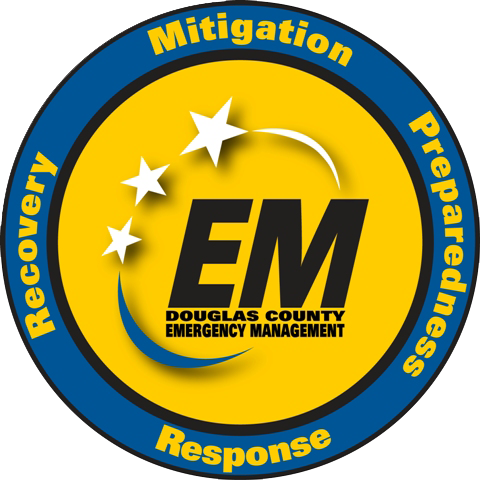Emergency Management
Open Burning Regulations and Safety
On November 29, 2023, Home Rule Resolution No. 23-11-3 was passed by the Board of County Commissioners. This resolution recommended updates to the county code that regulates open burning for the unincorporated areas of Douglas County and was necessary to promote fire safety and protect persons and property from the dangers of open burning. Additionally, a county policy has been created to put state and county regulations in one place which has definitions for open burning on agricultural and residential land as well as for recreational uses. It also describes enforcement and penalties for those who violate the regulations.
Burn Ban Criteria and Determination (Daily)
Burn bans are determined daily by 8AM using the Rangeland Fire Index and the Fire Weather Forecast. The following criteria are used for determining the issuance of an open burning ban.
Open burning is prohibited during:
- Red Flag Warnings.
- Local, county, or state-wide burn ban.
- Rangeland Fire Index of Very High or Extreme.
- Rangeland Fire Index of High, with a forecast for sustained winds of greater than 15mph.
- Rangeland Fire Index of Low or Moderate and a forecast for sustained winds greater than 20mph.
Open burning may be prohibited when a threat to the area exists or due to any other variables that could affect open burning. These variables include, but are not limited to:
- Local jurisdictional authority
- Resource limitations
- Local dry conditions
Log Your Burn and Get the Burn Status
All approved open burning must be reported to the Dispatch Center except for those defined in recreational burning. Douglas County has two ways to log your burn in the unincorporated areas.
- A NEW online form. The form will require a valid address that is in the unincorporated areas of Douglas County. The form allows you to log when you start burning and when your burn is complete. The form will display as "Closed" when a Burn Ban is issued.
- You'll need to follow municipal guidelines if you are burning within city limits.
- The Burn Hotline. Call 785-832-5394 to hear the current burn status and to record your burn with the Douglas County Dispatch Center.
For both logging methods, you'll need to be prepared to share the following information when logging your burn:
- Location of the intended burn
- Name, address and telephone number of the person responsible
- Duration and schedule of the burning
- Description of the proposed burn to include size/acreage, material, and reason for burning
By logging your burn through the Dispatch Center or via the online form, you agree to comply with the rules and regulations stated in the county open burning resolution and policy.
Subscribe to Burn Ban Notifications
A subscription is available for individuals who want to receive a notification when a burn ban is issued in addition to calling the burn hotline. Individuals who receive weather alerts through the NE Kansas Notification System (Everbridge) can log in to their account and add Douglas County Burn Ban Notifications to their subscriptions. Click here to create an account or learn more.
Allowed Open Burning - Definitions
Allowed open burning is limited to the following:
Agricultural open burning. The open burning of vegetation such as grass, woody species, crop residue, and other dry plant growth for crop, range, pasture, wildlife, or watershed management (this includes the burning of routine brush piles accumulated from the property). Materials (brush, limbs, and other materials) brought from another site cannot be burned.
Residential open burning. Open burning of nonhazardous materials generated from the residential parcel (unless otherwise prohibited) includes trees, brush, and yard waste. Prohibited materials for residential open burning include heavy smoke-producing materials including heavy oils, tires, and tarpaper as outlined in K.A.R. 28-19-647(e)(2).
Recreational open burning. Aside from the exception described below, notification to the Douglas County Dispatch Center is not necessary for this type of open burning.
- Open burning for cooking, warming or ceremonial purposes on public or private land regularly used for recreational purposes; provided, however, any fire exceeding five (5) feet in diameter at its base requires notification.
- Burning within a self-contained outdoor burning device designed for cooking or heating (barbecue grill or pit, camp stove, fire pit, etc.).
Burn Permit - Specifically approved open burning conducted under a burn permit granted by the BOCC.
KDHE-approved open burning. Open burning approved by the Kansas Department of Health and Environment (KDHE) according to K.A.R. 28-19-647 and approved by the fire control authority having jurisdiction over the area. Approval may be granted when there is no other practical means of disposal, it is in the public’s interest, and it is not prohibited by the local government or local fire authority. These activities include the following:
- Use of safety flares to dispose of flammable liquids and gases.
- Firefighter training (contact KDHE for additional specific requirements).
- Fires to remove dangerous or hazardous materials.
- Open burning of trees and brush not related to agricultural purposes, such as clearing land for development.
- Open burning of only clean wood waste from construction projects carried out at the construction site (does not include engineered wood product wastes such as plywood and pressed-wood products, pressure-treated wood lumber, and painted or stained wood wastes).
